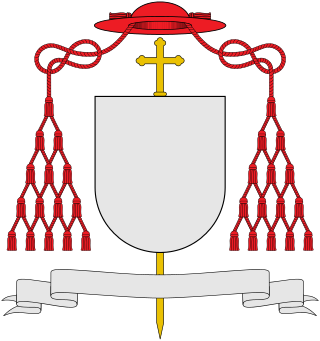
A cardinal is a senior member of the clergy of the Catholic Church. Cardinals are created by the pope and typically hold the title for life. Collectively, they constitute the College of Cardinals. The most solemn responsibility of the cardinals is to elect a new pope in a conclave, almost always from among themselves, when the Holy See is vacant. During the period between a pope's death or resignation and the election of his successor, the day-to-day governance of the Holy See is in the hands of the College of Cardinals. The right to participate in a conclave is limited to cardinals who have not reached the age of 80 years by the day the vacancy occurs. In addition, cardinals collectively participate in papal consistories, in which matters of importance to the Church are considered and new cardinals may be created. Cardinals of working age are also appointed to roles overseeing dicasteries of the Roman Curia, the central administration of the Catholic Church.

The Holy Roman Empire, also known as the Holy Roman Empire of the German Nation after 1512, was a polity in Central and Western Europe, usually headed by the Holy Roman Emperor. It developed in the Early Middle Ages and lasted for almost 1,000 years until its dissolution in 1806 during the Napoleonic Wars.

The prince-electors, pl. Kurfürsten, Czech: Kurfiřt, Latin: Princeps Elector) were the members of the electoral college that elected the ruler of the Holy Roman Empire.
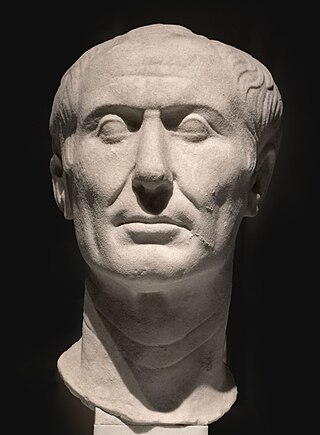
Gaius Julius Caesar was a Roman general and statesman. A member of the First Triumvirate, Caesar led the Roman armies in the Gallic Wars before defeating his political rival Pompey in a civil war, and subsequently became dictator from 49 BC until his assassination in 44 BC. He played a critical role in the events that led to the demise of the Roman Republic and the rise of the Roman Empire.
Pope Valentine was the bishop of Rome and ruler of the Papal States for two months in 827. He was unusually close to his predecessor, Eugene II, rumoured to be his son or his lover, and became pope before being ordained as a priest. He was a nobleman and elected by nobility, which later became the custom.

The Holy Roman Emperor, originally and officially the Emperor of the Romans during the Middle Ages, and also known as the Roman-German Emperor since the early modern period, was the ruler and head of state of the Holy Roman Empire. The title was held in conjunction with the title of king of Italy from the 8th to the 16th century, and, almost without interruption, with the title of king of Germany throughout the 12th to 18th centuries.

Pope Nicholas II, otherwise known as Gerard of Burgundy, was the head of the Catholic Church and ruler of the Papal States from 24 January 1059 until his death in 27 July 1061. At the time of his election, he was bishop of Florence. During his Papacy, Nicholas II successfully expanded the influence of the papacy in Milan and southern Italy. He was also responsible for passing papal election reforms.

King of the Romans was the title used by the king of East Francia following his election by the princes from the reign of Henry II (1002–1024) onward.
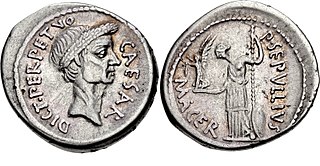
A Roman dictator was an extraordinary magistrate in the Roman Republic endowed with full authority to resolve some specific problem to which he had been assigned. He received the full powers of the state, subordinating the other magistrates, consuls included, for the specific purpose of resolving that issue, and that issue only, and then dispensing with those powers immediately.

The Western Schism, also known as the Papal Schism, the Great Occidental Schism, or the Schism of 1378, was a split within the Catholic Church lasting from 1378 to 1417 in which bishops residing in Rome and Avignon both claimed to be the true pope, and were joined by a third line of Pisan claimants in 1409. The schism was driven by personalities and political allegiances, with the Avignon Papacy being closely associated with the French monarchy.
The interrex was an extraordinary magistrate during the Roman Kingdom and Republic. Initially, the interrex was appointed after the death of the king of Rome until the election of his successor, hence its name—a ruler "between kings". The position was retained during the Republic when both consuls were unable to assume their duties, especially holding elections. Interreges ruled for only five days, which often led several of them to be appointed in succession, the record being 15 interreges in 326 BC. They were exclusively chosen from among patrician senators, and during the Conflict of the Orders, their appointment was sometimes designed to hinder plebeians from reaching power or passing laws.
Tribune of the plebs, tribune of the people or plebeian tribune was the first office of the Roman state that was open to the plebeians, and was, throughout the history of the Republic, the most important check on the power of the Roman Senate and magistrates. These tribunes had the power to convene and preside over the Concilium Plebis ; to summon the senate; to propose legislation; and to intervene on behalf of plebeians in legal matters; but the most significant power was to veto the actions of the consuls and other magistrates, thus protecting the interests of the plebeians as a class. The tribunes of the plebs were typically found seated on special benches set up for them in the Roman Forum. The tribunes were sacrosanct, meaning that any assault on their person was punishable by death. In imperial times, the powers of the tribunate were granted to the emperor as a matter of course, and the office itself lost its independence and most of its functions.

The Curiate Assembly was the principal assembly that evolved in shape and form over the course of the Roman Kingdom until the Comitia Centuriata organized by Servius Tullius. During these first decades, the people of Rome were organized into thirty units called "Curiae". The Curiae were ethnic in nature, and thus were organized on the basis of the early Roman family, or, more specifically, on the basis of the thirty original patrician (aristocratic) clans. The Curiae formed an assembly for legislative, electoral, and judicial purposes. The Curiate Assembly passed laws, elected Consuls, and tried judicial cases. Consuls always presided over the assembly. While plebeians (commoners) could participate in this assembly, only the patricians could vote.

A consul was the highest elected public official of the Roman Republic. Romans considered the consulship the second-highest level of the cursus honorum—an ascending sequence of public offices to which politicians aspired—after that of the censor, which was reserved for former consuls. Each year, the Centuriate Assembly elected two consuls to serve jointly for a one-year term. The consuls alternated each month holding fasces when both were in Rome. A consul's imperium extended over Rome and all its provinces.
A forum was a public square in a Roman municipium, or any civitas, reserved primarily for the vending of goods; i.e., a marketplace, along with the buildings used for shops and the stoas used for open stalls. Many fora were constructed at remote locations along a road by the magistrate responsible for the road, in which case the forum was the only settlement at the site and had its own name, such as Forum Popili or Forum Livi.

The Roman magistrates were elected officials in ancient Rome. During the period of the Roman Kingdom, the King of Rome was the principal executive magistrate. His power, in practice, was absolute. He was the chief priest, lawgiver, judge, and the sole commander of the army. When the king died, his power reverted to the Roman Senate, which then chose an Interrex to facilitate the election of a new king.

The Roman Senate was the highest and constituting assembly of ancient Rome and its aristocracy. With different powers throughout its existence it lasted from the first days of the city of Rome as the Senate of the Roman Kingdom, to the Senate of the Roman Republic and Senate of the Roman Empire and eventually the Byzantine Senate of the Eastern Roman Empire, existing well into the post-classical era and Middle Ages.
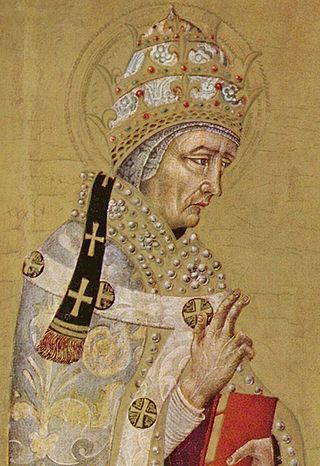
The selection of the Pope, the Bishop of Rome and Supreme Pontiff of the Catholic Church, prior to the promulgation of In Nomine Domini in AD 1059 varied throughout history. Popes were often putatively appointed by their predecessors or by political rulers. While some kind of election often characterized the procedure, an election that included meaningful participation of the laity was rare, especially as the Popes' claims to temporal power solidified into the Papal States. The practice of Papal appointment during this period would later result in the putative jus exclusivae, i.e., the claimed but invalid right to veto the selection that Catholic monarchs exercised into the twentieth century.

The 1972 United States Senate election in Illinois took place on November 7, 1972. Incumbent Republican United States Senator Charles H. Percy sought re-election to the United States Senate. Percy was opposed by Democratic nominee Roman Pucinski, a United States Congressman from Illinois's 11th congressional district, whom he was able to defeat handily to win a second term. As of 2022, this was the last time a Republican was elected to the U.S. Senate from Illinois during a presidential election year, the last time an Illinois Republican won a Senate election by double digits, and the last time any candidate has swept every county in the state. This election was the fourth consecutive time in which a United States Senate election in Illinois took place two years after a previous United States Senate election in Illinois after 1966, 1968 and 1970.
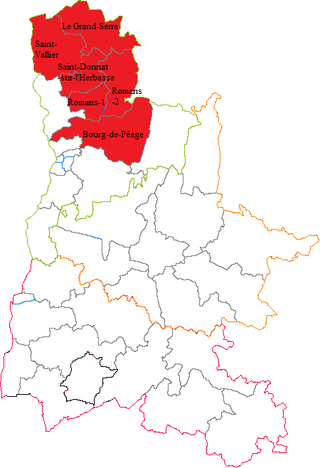
The 4th constituency of Drôme is a French legislative constituency in the Drôme département. It contains the cantons Bourg-de-Péage, Le Grand-Serre, Romans-sur-Isère-1, Romans-sur-Isère-2, Saint-Donat-sur-l'Herbasse and Saint-Vallier.












